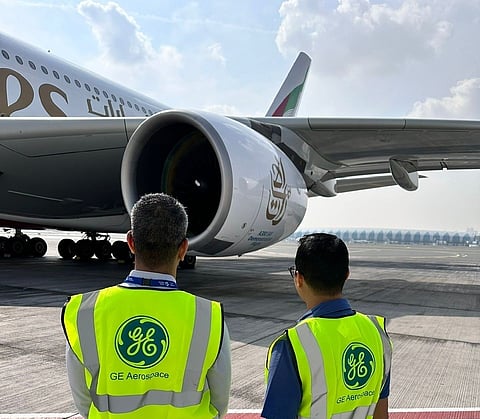GE Aerospace & Partners Test 10 Different Aircrafts with 100% SAF
GE Aerospace reached a new milestone for a more sustainable future of flight with the completion of testing on its 10th engine model using 100% Sustainable Aviation Fuel (SAF) since 2016, confirming the company and its joint ventures have one of the most expansive programs for testing the alternative fuel in the industry.
In 2018, GE90 engines powered the first commercial airliner flight with 100% SAF in both engines on the Boeing ecoDemonstrator, a 777 freighter in partnership with FedEx Express.
In 2021, LEAP-1B engines powered the first passenger experimental flight with 100% SAF in one of the two engines on a United Airlines Boeing 737-8.
This year, LEAP-1B engines powered test flights on 100% SAF in both engines of the Boeing ecoDemonstrator Explorer, a 737-10 destined for United Airlines, as part of emissions testing with NASA.
Most recently, in November, Emirates became the first airline to operate an Airbus A380 using 100% SAF in one of the four GP7200 engines.
Earlier this year, Emirates and GE Aerospace also partnered on the first demonstration flight in the Middle East region powered with 100% SAF in one of the two GE90 engines powering a Boeing 777-300ER.
These demonstration flights, which both took off from Dubai International Airport (DXB), showed the potential of SAF as a drop-in replacement that matches conventional jet fuel’s technical and chemical requirements.
With countries across the region working toward more sustainable practices in all sectors as outlined recently at COP28 in Dubai, SAF demonstrations add to an important body of data showing the viability of the fuel to help reduce life cycle emissions from flight.
Additional engines tested at the component-, engine-, or aircraft-level using 100% SAF include F414, GE9X, LEAP-1A*, Passport, GEnx, HF120, and CFM56 engines.
The wide range of tests represents a mix of propulsion systems used for domestic and international commercial air travel, military aviation, and business and general aviation. These tests also evaluated a wide scope of factors, such as engine performance and the impact of 100% SAF on contrails and emissions.
GE Aerospace and its joint ventures power three out of every four commercial flights globally.
“These tests demonstrate that we are leading and prepared to support our customers to operate on Sustainable Aviation Fuel. We’re proud of doing the hard work to better understand the impact of different emissions on the environment and using science to guide the technology we are developing to invent the future of flight,” said Mohamed Ali, Vice President of Engineering for GE Aerospace.
To help qualify new 100% SAFs, GE Aerospace is going from engine system testing to engine component and sub-component level evaluations. This encompasses evaluating components exposed to and impacted by fuels, from the engine fuel system to the combustor where fuel is burned.
Various SAF types produced from different pathways are being tested to assess whether there is any impact on engine operability, efficiency, durability, and emissions.
Industry net zero target
GE Aerospace’s SAF testing efforts support the aviation industry’s long-term goal of net zero CO2 emissions by 2050.
In an interim step, governments gathered in November at the third ICAO Conference on Aviation and Alternative Fuels (CAAF/3) in Dubai, setting a goal for aviation fuel in 2030 to be 5% less carbon intensive than conventional jet fuel used today.
This follows an earlier statement by seven chief technology officers of major aviation manufacturers including GE Aerospace calling for supportive government policies that accelerate the availability and adoption of qualified SAF.
Meeting the long-term net-zero goal also requires the industry to deploy revolutionary technologies for increased engine fuel efficiency.
To address this challenge, GE Aerospace has multiple demonstrators underway, including the CFM RISE (Revolutionary Innovation for Sustainable Engines) program in partnership with Safran Aircraft Engines and the Electrified Powertrain Flight Demonstration project with NASA.
The CFM RISE program targets more than 20 percent better fuel efficiency with 20% lower CO2 emissions compared to the most efficient engines in service today. New open fan engine architecture and hybrid electric systems in development are being designed for compatibility with 100% SAF.
Additionally, GE Aerospace is an inaugural investor in the United Airlines Ventures Sustainable Flight Fund to help increase the supply of SAF.


